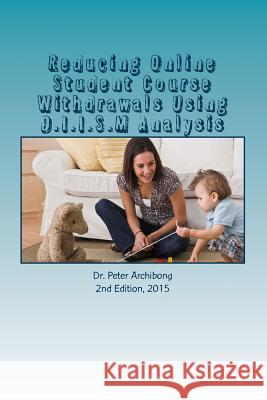Reducing Online Student Course Withdrawals Using D.I.I.S.M Analysis: An Assessment Of An Urban Technical College Online Courses » książka
Reducing Online Student Course Withdrawals Using D.I.I.S.M Analysis: An Assessment Of An Urban Technical College Online Courses
ISBN-13: 9781507684917 / Angielski / Miękka / 2015 / 118 str.
Reducing Online Student Course Withdrawals Using D.I.I.S.M Analysis: An Assessment Of An Urban Technical College Online Courses
ISBN-13: 9781507684917 / Angielski / Miękka / 2015 / 118 str.
(netto: 299,45 VAT: 5%)
Najniższa cena z 30 dni: 310,94
ok. 16-18 dni roboczych.
Darmowa dostawa!
The proliferation of online education in academic institutions over the past decade has revolutionized and challenged teaching and learning models. With distinct advantages over traditional face-to-face in the academic world, online learning reduces learners' travel costs as well as time away from their work and family. However, despite these benefits, online education continues to be challenged with high student withdrawals of 30-50% compared with 14% in the traditional classroom (Lynch, 2001). This research effort investigated the possible factors that may affect online students' withdrawals (OSW) at An Urban Technical College. An online survey of online students who completed and who withdrew was used to compare students' perception of their online course experience at An Urban Technical College. One survey was sent to online students who withdrew (OSW) and another was sent to online students who completed (OSC). The results showed that significant differences exist between OSC and OSW on the D.I.I.S.M analysis: Demographics: Age (55+); Institution: Orientation; Instructor: Email/phone contacts, availability/response time, returning of phone calls/emails, course relevance, hands on practice, suggested concept applications, and course-ware knowledge; Student: Family support and money access; Instruction Methods: Availability, ease of use, observation/reflection allowance, generalization allowance, self-assessment/practice test, and group activities/interactivity.
Zawartość książki może nie spełniać oczekiwań – reklamacje nie obejmują treści, która mogła nie być redakcyjnie ani merytorycznie opracowana.











